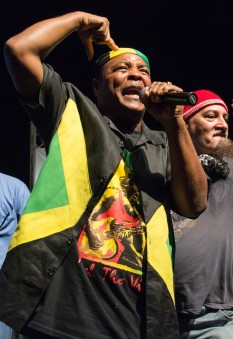The Gathering takes us on a lyrical dance…at once rub-a-dub, at once three-step, at once quiet crooning in your ears as you ‘rent-a-tile’ …Malachi the word-Smith has given us a poetry collection that seamlessly moves us through the soundscapes where love, history, memory, and the prophets sway our most powerful imaginings.” (Heather Russell – Author of Legba’s Crossing)
In The Gathering, Malachi displays his characteristic lyrical gifts in the exploration of subjects as diverse as travel, family, drug addiction, and the plight of the sufferahs. In these poems, the call of the Caribbean dances through memories that trigger his imagination and the various masks he employs to dramatize events. Sometimes a wizened storyteller, sometimes a prophet with magisterial lines, “Let them come,” Malachi delves into the political and class conflicts that divide the people of Jamaica and its diaspora, yet these differences disappear under the gaze of a poet who believes in the power of redemption. (Geoffrey Philp – Author of Garvey’s Ghost)
“Malachi Smith is the most dynamic poetry performer I’ve ever had the pleasure to witness.” (Philip Hammial, Australian poet and sculptor)
Malachi Smith was a founding member of the group Poets in Unity and worked in Jamaica as a police officer and as a dub poet, an unusual combination. He migrated to Florida in 1987, where he has continued to work in both two capacities. Over the years he has released several CDs (Throw Two Punch, 1998 ; The Blacker the Berry, The Sweeter the Cherry, 2001 ; Middle Passage, 2003 ; Luv Dub Fever, 2008 ; Hail to Jamaica, 2010; Scream, 2014; Wiseman, 2017) on which he performs his poems to the accompaniment of reggae music or a-cappella.
The new collection contains love poems, tributes to famous Jamaican icons and deeply nostalgic pieces about the Jamaica Malachi left behind when he emigrated. Music is often present in these pieces, constituting a kind of umbilical cord, a link with the poet’s home island. There are also pieces addressing the themes of poverty and battered women. The reggae tradition is of course heavily present with tributes to the late Dennis Brown, to Garnett Silk and to Cedric Brooks and also references to famous reggae hits like Culture’s “Stop the Fussing and Fighting” and Bob Marley’s “Misty Morning” (Dr Eric Doumerc, University of Toulouse-Jean Jaurès, France)



